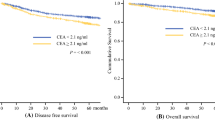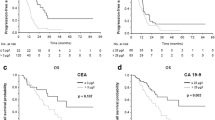Abstract
Colorectal cancer (CRC) can be cured in most cases if diagnosed at an early stage. Carcinoembryonic antigen (CEA) remains the most widely used cancer marker for determining prognosis of CRC. Previous studies have shown that plasmatic tumor M2 pyruvate kinase (Tu M2-PK) is highly sensitive in CRC detection at an early stage and equally as good as the results for established tumor markers with clinical potential for cancer prognosis and monitoring. The aim of this study was to assess the prognostic value of Tu M2-PK in plasma using a survival analysis in combination with CEA in serum in patients newly diagnosed with CRC. The initial study included 183 patients who had a complete diagnostic colonoscopy. This cohort study was designed to evaluate the survival in patients with histologically confirmed gastrointestinal cancers (n = 41). Tu M2-PK concentrations in EDTA plasma were determined immunologically using an ELISA assay. Plasma Tu M2-PK levels were significantly higher in patients with distant metastases, stage IV for TNM score, and advanced stage (C+D) subgroups of Dukes than other subgroups. The univariate Cox’s analysis showed that CEA and Tu M2-PK gave high hazard ratios for risk of death (odds ratio CEA = 3.57 and odds ratioTu M2-PK = 2.23) and comparable values in average survival time. The results for both biomarkers did not overlap. These findings suggest that plasmatic Tu M2-PK levels of more than 20 U/mL may be a predictor of death risk.


Similar content being viewed by others
References
Brenner H, Bouvier AM, Foschi R, Hackl M, Larsen IK, Lemmens V, et al. Progress in colorectal cancer survival in Europe, from the late 1980s to the early 21st century: the EUROCARE study. Int J Cancer. 1980;2011. doi:10.1002/ijc.26192.
Thirunavukarasu P, Sukumar S, Sathaiah M, Mahan M, Pragatheeshwar KD, Pingpank JF, et al. C-stage in colon cancer: implications of carcinoembryonic antigen biomarker in staging, prognosis, and management. J Natl Cancer Inst. 2011;103(8):689–97.
Goldstein MJ, Mitchell EP. Carcinoembryonic antigen in the staging and follow-up of patients with colorectal cancer. Cancer Invest. 2005;23(4):338–51. Epub 2005/08/17.
Duffy MJ, van Dalen A, Haglund C, Hansson L, Holinski-Feder E, Klapdor R, et al. Tumour markers in colorectal cancer: European Group on Tumour Markers (EGTM) guidelines for clinical use. Eur J Cancer. 2007;43(9):1348–60.
Ross JS. Biomarker-based selection of therapy for colorectal cancer. Biomark Med. 2011;5(3):319–32. Epub 2011/06/11.
Kumar Y, Tapuria N, Kirmani N, Davidson BR. Tumor M2-pyruvate kinase: a gastrointestinal cancer marker. Eur J Gastroenterol Hepatol. 2007;19(3):265–76.
Hardt PD, Ewald N. Tumor M2 pyruvate kinase: a tumor marker and its clinical application in gastrointestinal malignancy. Expert Rev Mol Diagn. 2008;8(5):579–85. Epub 2008/09/13.
Zhang B, Chen JY, Chen DD, Wang GB, Shen P. Tumor type M2 pyruvate kinase expression in gastric cancer, colorectal cancer and controls. World J Gastroenterol. 2004;10(11):1643–6. Epub 2004/05/27.
Schulze G. The tumor marker tumor M2-PK: an application in the diagnosis of gastrointestinal cancer. Anticancer Res. 2000;20(6D):4961–4.
Schneider J, Schulze G. Comparison of tumor M2-pyruvate kinase (tumor M2-PK), carcinoembryonic antigen (CEA), carbohydrate antigens CA 19-9 and CA 72-4 in the diagnosis of gastrointestinal cancer. Anticancer Res. 2003;23(6D):5089–93. Epub 2004/02/26.
Schneider J, Bitterlich N, Schulze G. Improved sensitivity in the diagnosis of gastro-intestinal tumors by fuzzy logic-based tumor marker profiles including the tumor M2-PK. Anticancer Res. 2005;25(3V):1507–15.
Goonetilleke KS, Mason JM, Siriwardana P, King NK, France MW, Siriwardena AK. Diagnostic and prognostic value of plasma tumor M2 pyruvate kinase in periampullary cancer: evidence for a novel biological marker of adverse prognosis. Pancreas. 2007;34(3):318–24.
Kumar Y, Pinedo IR, Tapuria N, Zabron A, Davidson BR. A comparison of tumour M2-PK with carcinoembryonic antigen and CA19-9 in patients undergoing liver resection for colorectal metastases. Eur J Gastroenterol Hepatol. 2008;20(10):1006–11.
Fernández-Suárez A, Puente-Gutiérrez JJ, Marín-Moreno MA, Aguilar-Benítez JM, Bernal-Blanco E, Fatela-Cantillo D, Díaz-Iglesias JM. Plasma tumour M2-pyruvate kinase and carcinoembryonic antigen are complementary in early detection of colorectal cancer. Clin Chem. 2010;56(6):A203. Supplements.
Scheer A, Auer RA. Surveillance after curative resection of colorectal cancer. Clin Colon Rectal Surg. 2009;22(4):242–50. Epub 2010/11/03.
Locker GY, Hamilton S, Harris J, Jessup JM, Kemeny N, Macdonald JS, et al. ASCO 2006 update of recommendations for the use of tumor markers in gastrointestinal cancer. J Clin Oncol. 2006;24(33):5313–27.
Hardt PD, Mazurek S, Toepler M, Schlierbach P, Bretzel RG, Eigenbrodt E, et al. Faecal tumour M2 pyruvate kinase: a new, sensitive screening tool for colorectal cancer. Br J Cancer. 2004;91(5):980–4.
Katoh H, Yamashita K, Kokuba Y, Satoh T, Ozawa H, Hatate K, et al. Diminishing impact of preoperative carcinoembryonic antigen (CEA) in prognosis of Dukes’ C colorectal cancer. Anticancer Res. 2008;28(3B):1933–41. Epub 2008/07/18.
Ugurel S, Bell N, Sucker A, Zimpfer A, Rittgen W, Schadendorf D. Tumor type M2 pyruvate kinase (TuM2-PK) as a novel plasma tumor marker in melanoma. Int J Cancer. 2005;117(5):825–30. Epub 2005/06/16.
Ahmed AS, Dew T, Lawton FG, Papadopoulos AJ, Devaja O, Raju KS, et al. Tumour M2-PK as a predictor of surgical outcome in ovarian cancer, a prospective cohort study. Eur J Gynaecol Oncol. 2007;28(2):103–8. Epub 2007/05/08.
Benesch C, Schneider C, Voelker HU, Kapp M, Caffier H, Krockenberger M, et al. The clinicopathological and prognostic relevance of pyruvate kinase M2 and pAkt expression in breast cancer. Anticancer Res. 2010;30(5):1689–94.
Landt S, Jeschke S, Koeninger A, Thomas A, Heusner T, Korlach S, et al. Tumor-specific correlation of tumor M2 pyruvate kinase in pre-invasive, invasive and recurrent cervical cancer. Anticancer Res. 2010;30(2):375–81.
Martinez-Balibrea E, Plasencia C, Gines A, Martinez-Cardus A, Musulen E, Aguilera R, et al. A proteomic approach links decreased pyruvate kinase M2 expression to oxaliplatin resistance in patients with colorectal cancer and in human cell lines. Mol Cancer Ther. 2009;8(4):771–8.
Staib P, Hoffmann M, Schinkothe T. Plasma levels of tumor M2-pyruvate kinase should not be used as a tumor marker for hematological malignancies and solid tumors. Clin Chem Lab Med. 2006;44(1):28–31. Epub 2005/12/27.
Data from the SEER 1973–2005 Public use file diagnosed in years 1998–2000. American Joint Committee on Cancer Staging Manual, 7th ed. New York: Springer; 2010
Hathurusinghe HR, Goonetilleke KS, Siriwardena AK. Current status of tumor M2 pyruvate kinase (tumor M2-PK) as a biomarker of gastrointestinal malignancy. Ann Surg Oncol. 2007;14(10):2714–20.
Cerwenka H, Aigner R, Bacher H, Werkgartner G, El-Shabrawi A, Quehenberger F, et al. TUM2-PK (pyruvate kinase type tumor M2), CA19-9 and CEA in patients with benign, malignant and metastasizing pancreatic lesions. Anticancer Res. 1999;19(1B):849–51.
Yamashita K, Watanabe M. Clinical significance of tumor markers and an emerging perspective on colorectal cancer. Cancer Sci. 2009;100(2):195–9.
Stillwell AP, Ho YH, Veitch C. Systematic review of prognostic factors related to overall survival in patients with stage IV colorectal cancer and unresectable metastases. World J Surg. 2011;35(3):684–92. Epub 2010/12/25.
Gregoire E, Hoti E, Gorden DL, de la Serna S, Pascal G, Azoulay D. Utility or futility of prognostic scoring systems for colorectal liver metastases in an era of advanced multimodal therapy. Eur J Surg Oncol. 2010;36(6):568–74.
Jessup JM, Gunderson LL, Greene FL, Washington MK, Compton CC, Sobin LH, et al. 2010 staging system for colon and rectal carcinoma. Ann Surg Oncol. 2011;18(6):1513–7. Epub 2011/03/30.
Conflicts of interest
None
Author information
Authors and Affiliations
Corresponding author
Rights and permissions
About this article
Cite this article
Fatela-Cantillo, D., Fernandez-Suarez, A., Moreno, M.A.M. et al. Prognostic value of plasmatic tumor M2 pyruvate kinase and carcinoembryonic antigen in the survival of colorectal cancer patients. Tumor Biol. 33, 825–832 (2012). https://doi.org/10.1007/s13277-011-0304-0
Received:
Accepted:
Published:
Issue Date:
DOI: https://doi.org/10.1007/s13277-011-0304-0




